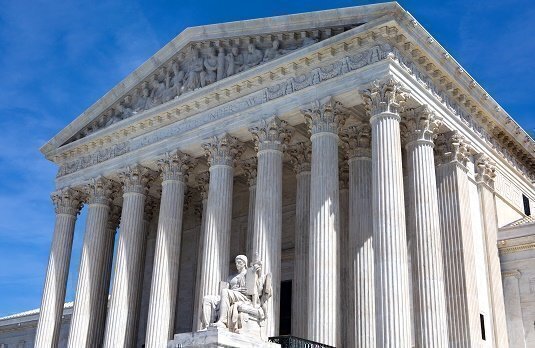Some of the nation’s largest operators of hospitals and other health care facilities are entitled to be exempt from the federal employee benefit plan law, if they have a link to a church or other religious organization, the Supreme Court ruled Monday.
 Their plans, the unanimous ruling said, qualify for the “church plan” exemption even if they were not set up or are not managed by churches or church organizations.
Their plans, the unanimous ruling said, qualify for the “church plan” exemption even if they were not set up or are not managed by churches or church organizations.
The ruling appeared likely to put a stop to a trend in lower courts to reject those organizations’ claims that their benefit plans are exempt from federal regulation under the Employee Retirement Income Security Act of 1973. It also will mean that they will not have to obey the Affordable Health Care Act’s mandate to provide free contraceptives for their women employees – if that mandate survives an expected move to rewrite it by the new Trump Administration.
ERISA is a complex federal law that regulates pension, health and other welfare benefit plans for employees, and among other goals seeks to assure that the plans are operated for the benefit of employees and their families, not for the plan managers or the company or entity that has the plan. But the law simply does not apply to a benefit plan that qualifies as a “church plan.” (The ACA contraceptive mandate picks up that exemption for church plans from ERISA.)
For years, federal agencies treated the plans as exempt from ERISA, if they were set up or maintained by a church or group of churches. In 1980, Congress amended ERISA to say that the exempt category would thereafter include a plan operated by an organization set up to manage the plan, if that organization was affiliated with a church.
In recent years, employees of hospital and health care chains decided to challenge the exemptions that those organizations had been given. Their main argument, which turned out to be a winning argument in the three federal appeals courts that so far have ruled on the challenges, was that an exemption is available only if the plan and the managing organization were originally created by a church or group of churches.
On Monday, the Supreme Court, while conceding that the history of Congress’s passage of the 1980 change does not give a clear-cut answer to what it means, overturned the lower court rulings in favor of the employees. Using a series of logical formulations, the main opinion’s author, Justice Elena Kagan, concluded that the hospitals had the better of the argument, so they are entitled to the “church plan” exemption even if not set up or not currently managed by a church, so long as they maintain an affiliation with a religious organization.
Justice Sonia Sotomayor, writing only for herself, said she accepted the result laid out in the main opinion, but she said she was troubled by it. Some of the organizations that now qualify as exempt, she wrote, are major corporate health care chains, operating as profit-making entities with thousands of employees and bringing in “billions in revenue” and competing with other companies “that must bear the cost of complying with ERISA.”
Those exempt organizations, she wrote, “bear no resemblance to those Congress considered when enacting the 1980 amendment to the church plan definition.” She suggested that Congress might now “take a different path.”
The lead case of the three decided by the court Monday was Advocate Health Care Network v. Stapleton.
Justice Neil M. Gorsuch, who was not on the court when the case was argued in March, did not take part in the decision.
Now that June has arrived, it has started the move to release all remaining decisions – 21 remain – so that it can recess for the summer at the end of the month. Besides those remaining cases, the court must decide how to deal with the Trump Administration’s appeals seeking to enforce its strict new proposals to limit immigration from Mideast nations and refugees from around the world.
Legendary journalist Lyle Denniston is Constitution Daily’s Supreme Court correspondent. Denniston has written for us as a contributor since June 2011 and has covered the Supreme Court since 1958. His work also appears on lyldenlawnews.com.






